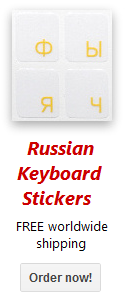| FR | About us | Home | User agreement | Link to us |
Russian Nouns and Cases
Noun Gender and Number
In this lesson you will learn about three genders, as well as plural and singular forms of Russian nouns.
The Cases of Russian Nouns at a Glance
The Russian "ear" is very sensitive to the endings of nouns. This lesson will introduce you into the six cases of a noun. Cases show what role nouns play in the sentence and set the rules of choosing correct endings.
The Nominative Case
Lesson on the usage of the initial form of Russian nouns. It is also called the dictionary form because all dictionary entries for Russian nouns appear in the nominative.
The Declension of Singular Nouns
Learn how Russian nouns change by case and number.
Usage of Cases
In Russian, it is the case of a noun that shows what role the noun plays in a sentence. The table below shows how the noun "Алексей" (a male name) changes by cases.
Russian Suffixes
A suffix is usually a group of letters which goes at the end of a word and carries new meaning. This lesson teaches some more common suffixes of Russian nouns. Being able to spot suffixes will help you to work out the meanings of many Russian nouns.
The Prepositional Case
Nouns get the prepositional case when you use them to designate a place, time, or an object of thought. This lesson will teach you how to use and form the prepositional in Russian.
The Instrumental Case
It is easy to remember that the instrumental is used to describe the instrument by which an action is performed. This lesson will teach you how to use and form the instrumental case of Russian nouns.
The Accusative Case
The accusative is used to talk about a person or thing to whom or which and action is being done. In this lesson you will learn everything you will need to use the accusative of Russian nouns correctly.
The Dative Case
The principal meaning of the dative case is "to" or "for". It is used to show that something is given or addressed to someone or something.
The Genitive Case
The principal meaning of the genitive case is "of". However Russians do not use "of" in itself and put nouns into the genitive instead. In this lesson you will learn how to use the genitive of Russian nouns.
Agreement of Nouns with Numbers
This lesson shows how Russian nouns agree with numbers. You will learn how to ask questions beginning with "How much..." and how to answer them in Russian.
The Declension of Plural Nouns
A summary of endings for plural nouns in the first, second, and third declensions.
500 Most Common Russian Nouns
A frequency list for Russian nouns with English translations, genders, and examples of usage.
Got questions?
Ask them in the Russian Questions and Answers — a place for students, teachers and native Russian speakers to discuss Russian grammar, vocabulary, pronunciation, and other aspects of the Russian language.
Copyright 2001-2026 MasterRussian.com | Privacy Policy | Contact Us
 Russian Lessons
Russian Lessons
- Russian alphabet
- Names of letters
- Russian Q&A new
- Pronunciation: Cons.
- Pronunciation: Vowels
- Noun Gender/Number
- Cases of Nouns
- Russian Greetings
- Personal Pronouns
- Learning Russian
- 1000 Common Words
- 500 Russian Verbs
- Top Russian Nouns
- » All lessons
- » Guest lessons
 Browse Topics
Browse Topics
- Start learning Russian
- Forum
- Bookstore
- Dictionaries
- Russian - basic
- Russian - adv
- Pronunciation
- Russian Blog new
- Reading
- Test & quizzes
- Translation
- Verbs
- Verb Conjugations
- Russian numbers
- Russian Tests new
- Vocabulary
- Writing
- Folk music
- Fun stuff
- Leo Tolstoy
- Learner's lore
- Literature
- Personal blogs
- Picture Dictionary new
- Proverbs
- Publications
- Radio & TV
- Russian culture
- Schools in Russia
- Russian Words
- Russian names
- Software
- Russian Words iPhone

Search MasterRussian

English » Russian dictionary

WORD OF THE DAY
![]() RSS
|
iGoogle
|
My Yahoo!
RSS
|
iGoogle
|
My Yahoo!
Meaning: war, warfare
Pronunciation: [vigh-NAH]
Learn Russian words more... »
TODAY'S STREET SIGN

Russian: Свежее пиво в кегах
English: Fresh beer in kegs
FOLLOW US ON TWITTER

MasterRussian on Twitter


